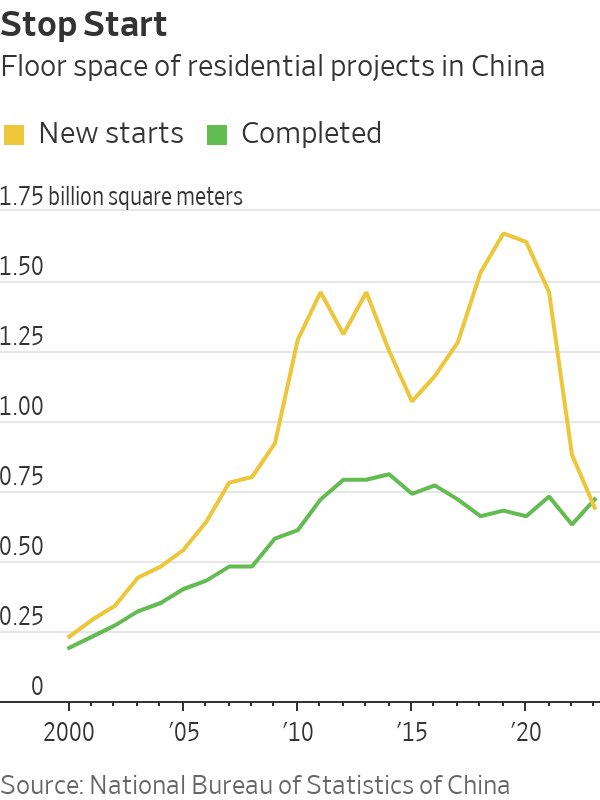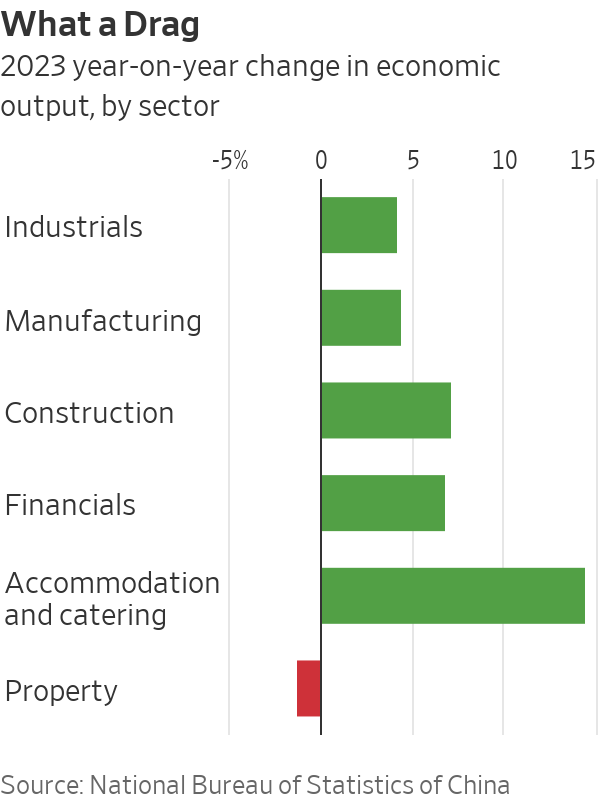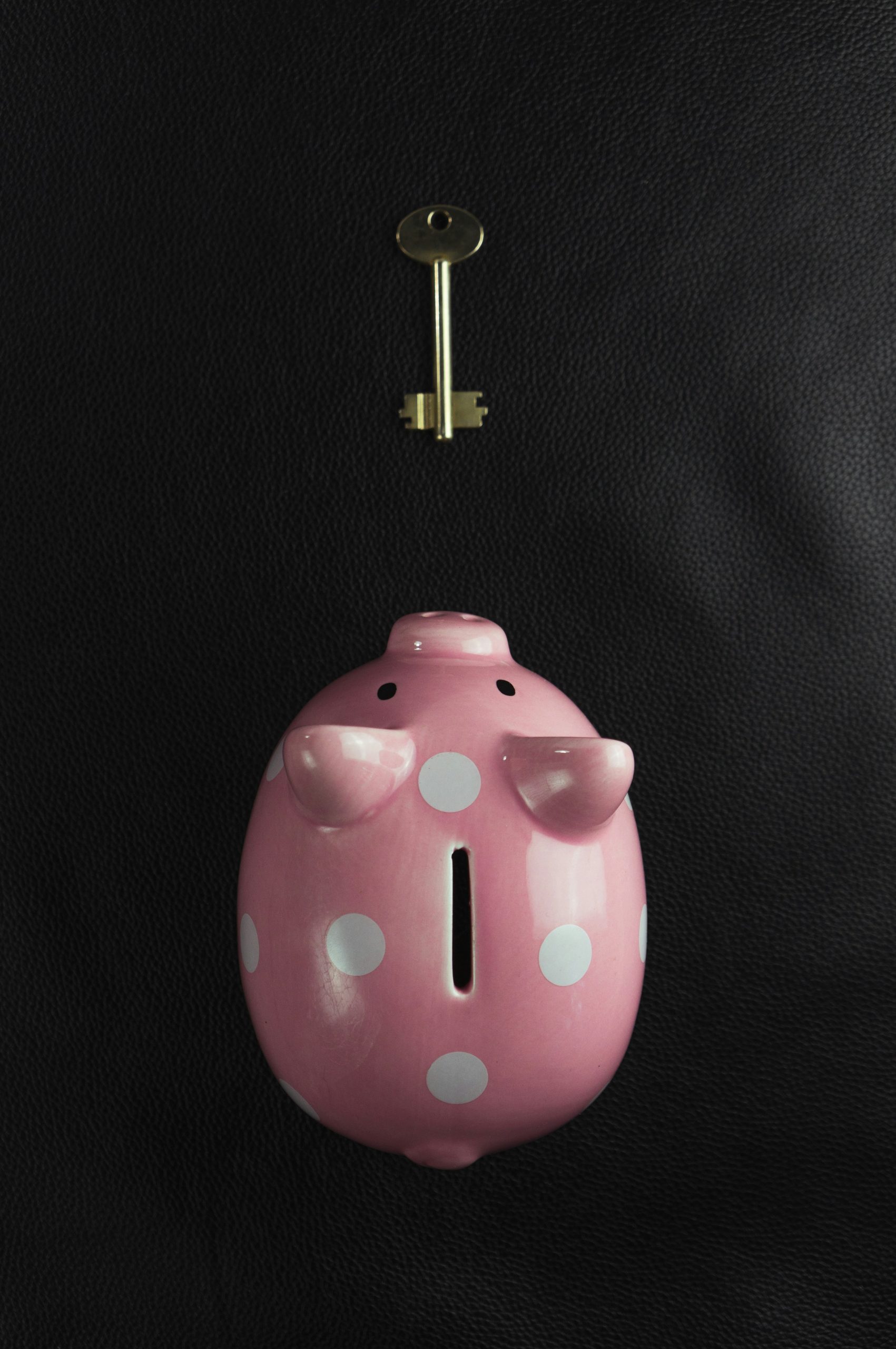Desperate Chinese Property Developers Resort to Bizarre Marketing Tactics
The country’s real-estate slump is getting worse—and looks set to drag on for years
China’s real-estate crisis has dragged down the economy, caused massive layoffs and pushed multibillion-dollar companies to the point of collapse.
Economists think it is about to get worse.
Sales of newly built homes in China fell 6% last year, returning to a level not seen since 2016, according to China’s statistics bureau. Secondhand home prices in its four wealthiest cities—Beijing, Shanghai, Guangzhou and Shenzhen—declined by between 11% and 14% in December from the year before, according to the broker Centaline Property.
Developers are starting fewer projects. Homeowners are paying back their mortgages early and borrowing less. Once-thriving property companies are stuck in protracted negotiations with foreign investors, following defaults on about $125 billion of overseas bonds between 2020 and late 2023, according to figures from S&P Global Ratings.

Chinese developers and local governments are so desperate to attract home buyers that some have resorted to bizarre marketing strategies.
A property company in Tianjin ran a video advertisement featuring the slogan “buy a house, get a wife for free.” It was a play on words, using the same Chinese characters as the phrase “buy a house, and give it to your wife”—but presented in a sentence structure typically used to offer freebies for home buyers. In September, the company was fined $4,184 for the ad.
A residential compound in eastern China’s Zhejiang province promised last year to give home buyers a 10-gram gold bar.
Earlier this month, Sheng Songcheng, former head of the statistics department at the People’s Bank of China, told a local conference that the housing downturn would last another two years. He thinks new-home sales will fall more than 5% in both 2024 and 2025.
Wall Street economists are also ringing alarm bells about how long the real-estate slump will last.

“Not too many people are buying, can buy or want to buy,” said Raymond Yeung, chief China economist at ANZ. He said there had been a fundamental shift in the way Chinese people view the property sector, with housing no longer seen as a safe investment.
China’s real-estate sector and related industries once accounted for around a quarter of gross domestic product and the sector’s slump has been a significant drag on the world’s second-largest economy. That has increased calls for Beijing to do more to prop up the sector, but so far Chinese officials have stuck to piecemeal policies rather than introducing a landmark stimulus package.
A number of economists are making comparisons to Japan, which spent decades trying to rebound from a crash in real-estate and stock prices. China’s stock market is in a years-long slump.
China’s central bank can help make the situation less painful, but it will need to be aggressive, said Li-gang Liu, head of Asia Pacific economic analysis at Citi Global Wealth Investments. The central bank still has policy room and could take one big step to make a significant impact, he said.
Liu Yuan, head of property research at Centaline, said that without the government’s help, new-home prices will need to drop by another 50% from current levels before they reach a bottom. This is based on the assumption that the tipping point will only come when it is cheaper to buy than to rent houses, Liu said.
China’s real-estate downturn has claimed dozens of victims. More than 50 developers—mostly privately owned—have defaulted on their debt. Developers still have millions of unfinished homes that were sold but not delivered. Chinese authorities have set aside billions of dollars to help builders complete apartments but the logjam is growing.
The crisis has drained the coffers of some Chinese local governments, which previously relied on land sales as a main source of income. Economists estimate they have hidden debt worth anything from $400 billion to more than $800 billion. To quiet talk of potential defaults, the central government has set up debt-swap programs to help some of them refinance.
Some economists are optimistic. In the first half of this year, buyers of secondhand homes will gradually return to the new-home market and prop up the sector, said Helen Qiao, chief China economist at Bank of America. “Things will slowly get better from here,” Qiao said.
But most are still expecting more pain, and investors are bearish. A benchmark of Hong Kong-listed property stocks had fallen for four years in a row before the start of this year. Since Jan. 1, it is down another 15%.
 Copyright 2020, Dow Jones & Company, Inc. All Rights Reserved Worldwide. LEARN MORE
Copyright 2020, Dow Jones & Company, Inc. All Rights Reserved Worldwide. LEARN MORE
This stylish family home combines a classic palette and finishes with a flexible floorplan
Just 55 minutes from Sydney, make this your creative getaway located in the majestic Hawkesbury region.
If you’re looking to secure a home loan, you might want to consider these expert tips…
No matter whether you’re a first home buyer or a seasoned investor, entering the property market right now, in whatever capacity, is a tricky task thanks to high interest rates and a super competitive market across the board.
With Google searches like ‘how much deposit do I need to buy a house’ and ‘how to get a home loan’ currently trending, there’s one question potential buyers should be asking, as well: ‘what are the things to stop doing before applying for a home loan’.
Barbara Giamalis, a mortgage broker at Tiimely Home, has over 25 years of experience on the matter, and says there are certainly some factors to consider when applying for a home loan that can better your chances of success.
“There’s no right or wrong time to purchase a home; it all depends on every person’s financial situation, but you must ensure you’re comfortable paying back the loan based on your personal financial circumstances,” said Ms Giamalis.
“The number one question I’m asked is, ‘how much can I borrow?’, but there’s a huge difference between what people can borrow now in comparison to rates. By enacting some of these small tips below, it might just be the difference between getting approved or denied for a home loan.”
Below, Ms Giamalis lists five things you should consider stopping if you’re planning to apply for a home loan. And with predications of lower interest rates coming into play this year, there’s never been a better time to get on top of the home loan race.
—
1. Consider cancelling your credit card
This is a simple one. Typically, if you’re looking to borrow more money for a higher loan, it’s wise to close any credit card accounts you have open. Contrary to popular opinion, you definitely don’t need a credit card to build your credit score to get a home loan.
“If you’ve got credit cards, try and pay them off and cancel them before applying for a loan because it gives you greater borrowing power,” said Ms Giamalis.
“You don’t need a good credit score through a credit card to get approved for a home loan as your credit rating is what it is. If you’re a first-time borrower and never had a loan, your rating won’t be great, it might be around 700, but it’s better than having 800 with two credit cards.”
Typically, a credit card rating is calculated from your credit report, which is essentially a history of your credit card actions. It’s calculated based off your line of credit (the amount you have borrowed), your credit application history, and whether you have paid your debts in time. Your score will be highlighted between zero to 1,200; the higher the score, the better your odds are of getting a loan. The lower your score, riskier you present to potential lenders.

2. Stop using ‘Buy Now, Pay Later’ schemes
We’ve all been there. ‘Buy Now, Pay Later’ services present as extremely attractive payment alternatives when shopping online. But therein lies the danger; such services rely on its customers not making repayments in time.
And if you’re considering applying for a home loan, it’s wise to avoid using such services all together.
“If an applicant opts to pay off purchases in increments, even interest-free payments, this could signal to some lenders that the applicant may not be financially stable,” said Ms Giamalis.
“Most lenders will look at the living expenses of an applicant. If an applicant is using ‘buy now, pay later’ services more than what they have in their savings, this could be a red flag and lenders could question whether they can afford a loan.”
Services like Afterpay also have the right to report any missed payments on your credit history, which could definitely have a negative impact to your credit score.
3. Don’t put off saving for future mortgage repayments
Before applying for a home loan, a good indication of whether you would be able to afford the monthly repayments on your mortgage is demonstrating the ability to save the amount. This, along with saving for your ten or 20 percent deposit, will put you in good stead for your home loan preparation, and will show lenders that you’re disciplined when it comes to finances.
“One of the best tips for young people, and one they can start doing now, is to start saving for their monthly mortgage payment before applying for a home loan as it shows dedication,” said Ms Giamalis.
Ms Giamalis adds that having a three-month saving history is a great way to prove this to potential lenders.
Here are some friendly financial tools to assist you along the way.

4. Stop gambling and making cash withdrawals
According to Gambling Statistics Australia, 6.8 million Australians participate in some form of gambling each year. This could include activities like buying a ticket in the lottery right through to using gambling apps and visiting casinos. This can present as an obvious red flag to lenders, who will take this into account when deciding to service a home loan application or not.
Another factor to consider is cash withdrawals. If you’re someone who is making regular ATM cash withdrawals per week or per month, this can be a problem as the potential lender can’t track where this money is going. Experts suggest it’s better to have purchases that are traceable.
“Large one-off purchases such as a couch, a new hot water service or a motor vehicle, won’t be taken into an applicant’s living expenses as it’s a one-off meaning the banks will look at that as a discretionary cost,” added Ms Giamalis.

5. Don’t hold onto student debt
One of the key considerations your mortgage broker or financial professional will consider in the home loan application process is paying out any debts you may have outstanding, such as your higher education debt.
It might seem obvious that paying off a HECS debt will strengthen your chances of obtaining a home loan, however, Ms Giamalis says many people often don’t factor in these debts.
“The Higher Education Loan Program (HELP) impacts your borrowing power. HELP debt is a liability that you need to declare in the home loan application process,” said Ms Giamalis.
“The impact of HECS on your ability to get a home loan may vary depending on your income level and the amount of your HECS debt. Seeking financial advice before deciding to pay off your debt is crucial.”
Many are not in the position to pay off their student loans immediately, so this point comes as an additional should you be in the position to do so. This also applies even in light of the Federal Government’s proposal to wipe a reported $3 billion in debt from three million Australians who have HECS debts through indexation changes, essentially capping indexation rate for loans. The proposal is designed to lend a hand in helping young tertiary educated Australians pay off their student loans.
—
Just 55 minutes from Sydney, make this your creative getaway located in the majestic Hawkesbury region.
Consumers are going to gravitate toward applications powered by the buzzy new technology, analyst Michael Wolf predicts























